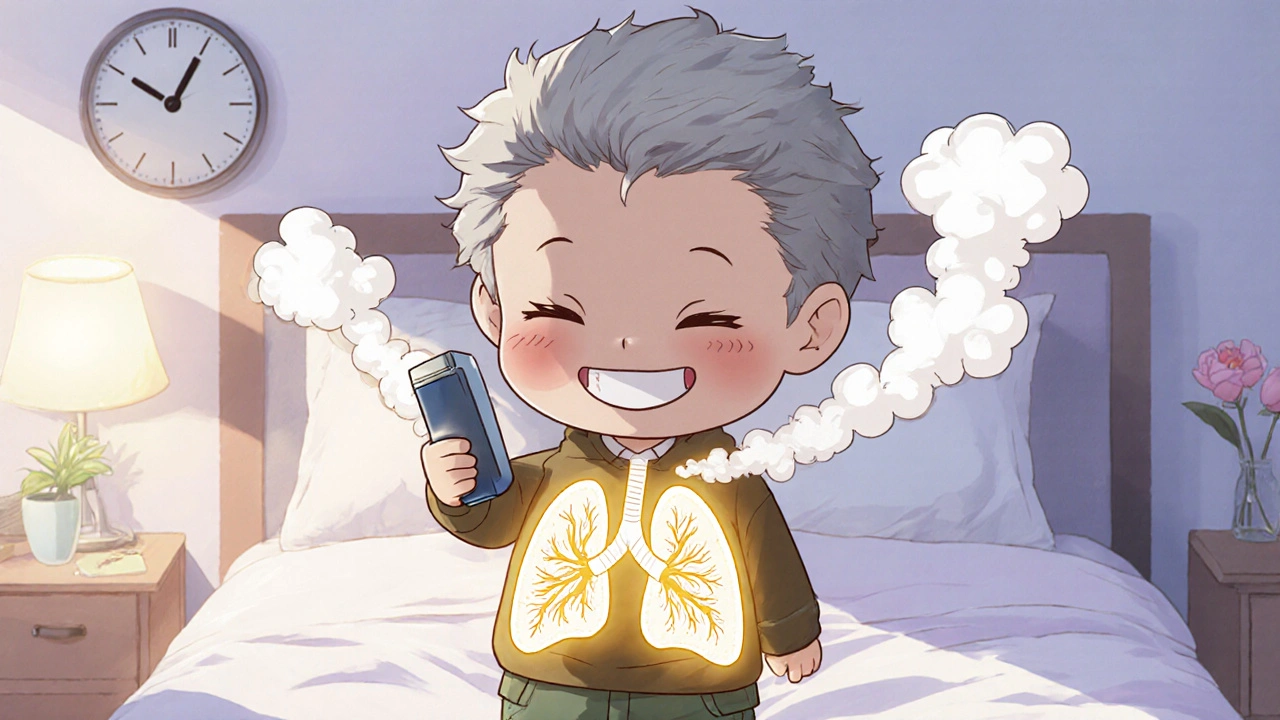Ipratropium Bromide for Smokers: How It Helps with Chronic Cough
28 Oct, 2025Smokers who’ve been coughing for years know this feeling all too well: that deep, rattling cough that won’t quit, no matter how much water you drink or honey you swallow. It’s not just annoying-it’s exhausting. Many assume it’s just "smoker’s cough" and that nothing can be done. But for some, the answer isn’t more cough syrup or quitting cold turkey-it’s a prescription inhaler called ipratropium bromide.
What Is Ipratropium Bromide?
Ipratropium bromide is a bronchodilator, meaning it helps open up the airways in your lungs. It’s been around since the 1970s and is most commonly used in inhalers like Atrovent. Unlike albuterol, which stimulates the nervous system to relax airway muscles, ipratropium works by blocking a specific nerve signal that causes tightening. Think of it like turning off a switch that’s forcing your airways to squeeze shut.
It’s not a steroid. It doesn’t reduce inflammation. And it doesn’t cure smoking damage. But for people with chronic bronchitis-common in long-term smokers-it reduces mucus production and eases coughing fits. The effect isn’t instant, but within 15 to 30 minutes of using the inhaler, many users report a noticeable drop in coughing, especially in the morning when mucus builds up overnight.
Why Smokers Get Chronic Cough
When you smoke, the tiny hair-like structures in your lungs called cilia get damaged. These normally sweep mucus and debris out of your airways. When they stop working, mucus pools. Your body tries to clear it by coughing. Over time, the lining of your bronchial tubes thickens and produces even more mucus. This is chronic bronchitis-a form of COPD.
A 2023 study in the European Respiratory Journal tracked 1,200 long-term smokers with persistent cough. Nearly 68% of them had signs of chronic bronchitis. Of those, 41% reported that their cough was severe enough to disrupt sleep, work, or social life. Many tried over-the-counter cough suppressants. Few found lasting relief.
That’s where ipratropium bromide comes in. It doesn’t fix the root cause-smoking-but it tackles one of the most disruptive symptoms: excessive mucus and the cough it triggers.
How Ipratropium Bromide Works for Smokers
Smokers with chronic cough often have overactive mucus glands in their airways. Ipratropium bromide blocks the muscarinic receptors that tell those glands to produce more mucus. Less mucus means less trigger for coughing.
It also helps relax the smooth muscles around the bronchial tubes. In smokers with narrowed airways, this can make breathing easier and reduce the feeling of tightness that often accompanies coughing.
Unlike oral cough medicines that suppress your cough reflex (and can leave mucus stuck in your lungs), ipratropium lets your body clear mucus naturally-just without the violent coughing fits.
Most users take it via a handheld inhaler, usually 2 puffs, 3 to 4 times a day. Some doctors prescribe it as a nebulizer solution for more severe cases. The inhaler is easy to use, portable, and doesn’t require a power source.
Real Results: What Smokers Say
One man in his late 50s from Brisbane, who smoked for 35 years, started using ipratropium bromide after his GP ruled out asthma and pneumonia. He’d been coughing so hard he’d lost three teeth from the strain. Within a week of using the inhaler twice daily, he noticed he wasn’t waking up choking on mucus. After a month, he was coughing less than half as often.
"I didn’t expect it to work," he said. "I thought it was just part of being a smoker. But now I can go to the shops without someone asking if I’m sick. It’s not magic-but it’s the first thing that actually helped."
Another user, a 48-year-old woman who quit smoking two years ago but still had a daily cough, found that ipratropium helped her transition out of the "post-smoker cough" phase. Even after quitting, the damage to her airways took time to heal-and the inhaler gave her relief while her body recovered.

Who Should Use It? Who Should Avoid It?
Ipratropium bromide is typically prescribed for:
- Smokers with chronic bronchitis and persistent cough
- People with COPD who have mucus-related coughing
- Those who’ve tried OTC cough meds with no success
It’s not for everyone. Avoid it if you:
- Have a known allergy to atropine or similar drugs
- Have narrow-angle glaucoma
- Have trouble urinating due to an enlarged prostate
Side effects are usually mild: dry mouth, bitter taste, or occasional dizziness. Rarely, it can cause blurred vision or rapid heartbeat. If you feel your heart racing after using it, stop and call your doctor.
It’s not a replacement for quitting smoking. But for those not ready-or not able-to quit yet, it’s a tool to make life more bearable.
How to Use It Correctly
Using the inhaler wrong means you’re not getting the full dose. Here’s how to do it right:
- Shake the inhaler well.
- Breathe out fully-away from the inhaler.
- Place the mouthpiece between your lips and seal your lips around it.
- Press down on the canister to release one puff while breathing in slowly through your mouth.
- Hold your breath for 10 seconds, then breathe out slowly.
- If you need a second puff, wait 30 seconds and repeat.
Rinse your mouth with water after each use to avoid dryness and thrush. Keep the inhaler clean-wipe the mouthpiece weekly with a dry cloth.
Can You Use It With Other Medications?
Yes, but carefully. Ipratropium bromide is often combined with albuterol in combination inhalers like Combivent. If you’re already on a steroid inhaler for inflammation, your doctor might prescribe both. But never mix it with other anticholinergic drugs (like some bladder medications or certain antidepressants) without checking with your doctor. The combined effect can be too strong.
If you’re on blood pressure meds or heart medication, mention ipratropium to your pharmacist. While interactions are rare, they can happen.

Is It Covered by Insurance?
In Australia, ipratropium bromide inhalers are listed on the Pharmaceutical Benefits Scheme (PBS). With a valid prescription, most Australians pay under $30 per script. Some pharmacies offer it even cheaper through generic brands. In the U.S., it’s typically covered by insurance, with copays ranging from $10 to $50 depending on the plan.
Don’t skip getting a prescription just because you think it’s "just a cough." If it’s affecting your daily life, it’s worth discussing with your GP or respiratory specialist.
What If It Doesn’t Work?
Not everyone responds. If you’ve used ipratropium bromide for 4 to 6 weeks and still have severe coughing, your doctor may consider:
- Checking for other conditions like asthma, GERD, or post-nasal drip
- Switching to a combination inhaler (ipratropium + albuterol)
- Trying a short course of oral steroids if inflammation is high
- Referring you to a pulmonologist for lung function tests
Some smokers have underlying emphysema or undiagnosed asthma. Ipratropium helps with mucus, but not with wheezing or shortness of breath from airway narrowing. That’s where other treatments come in.
The Bigger Picture: It’s Not a Cure, But It’s a Lifeline
Let’s be clear: ipratropium bromide won’t heal your lungs. Only quitting smoking can do that. But for millions of smokers who aren’t ready to quit-or who’ve tried and failed-it offers something rare: relief.
Chronic cough doesn’t just disrupt sleep. It can lead to social isolation, urinary incontinence, rib fractures, and even depression. If you’ve lived with it for years, you’ve probably accepted it as your new normal. But you don’t have to.
Ipratropium bromide isn’t flashy. It doesn’t make headlines. But for the smoker who can finally sleep through the night, or who can laugh without coughing, it’s a quiet miracle.
If you’ve been coughing for more than three months and you smoke, talk to your doctor. Ask about ipratropium bromide. It might not fix everything-but it might fix enough to make a real difference in your life.
Can ipratropium bromide help me quit smoking?
No, ipratropium bromide doesn’t reduce nicotine cravings or withdrawal symptoms. It only helps with the cough caused by mucus buildup in the airways. If you want to quit smoking, talk to your doctor about nicotine replacement therapy, prescription medications like varenicline, or counseling programs.
How long does it take for ipratropium bromide to work?
Most people notice less coughing within 15 to 30 minutes after using the inhaler. But it can take up to 2 weeks of regular use to see the full benefit, especially if your airways are very irritated. Don’t stop using it just because you don’t feel better right away.
Is ipratropium bromide safe for long-term use?
Yes. Ipratropium bromide has been used safely for decades in people with COPD. There’s no evidence it causes lung damage or tolerance with long-term use. However, it’s meant for symptom control-not as a replacement for quitting smoking. Regular check-ups with your doctor are still important.
Can I use it with an asthma inhaler?
Yes, many people use ipratropium bromide along with albuterol or other asthma inhalers. In fact, combination inhalers like Combivent contain both. But don’t mix them unless your doctor advises it. Using too many inhalers at once can increase side effects like dry mouth or rapid heartbeat.
Does ipratropium bromide cause weight gain?
No, ipratropium bromide doesn’t cause weight gain. Unlike steroid inhalers, it doesn’t affect metabolism or appetite. Any weight changes are more likely tied to smoking habits, diet, or activity levels.
What’s the difference between ipratropium and albuterol?
Albuterol relaxes airway muscles quickly, making it great for sudden wheezing or shortness of breath. Ipratropium reduces mucus and works more slowly, making it better for chronic cough and phlegm. Many smokers benefit from using both-albuterol for quick relief, ipratropium for daily control.

Tyler Wolfe
October 30, 2025 AT 07:17man i didnt know this was a thing. i’ve been coughing for years and just thought it was normal. i’ll ask my doc about it next week.
Neil Mason
November 1, 2025 AT 00:48just tried this last month after my pcp pushed it. wow. i used to wake up choking every morning. now i just cough once and go back to sleep. not magic but it’s the first thing that actually worked. thanks for posting this
Andrea Gracis
November 1, 2025 AT 15:08i quit smoking 3 years ago but still had this cough like a machine. this inhaler helped me finally feel normal again. i thought the damage was permanent but turns out my body just needed a little help cleaning up
Matthew Wilson Thorne
November 2, 2025 AT 05:54it’s just an anticholinergic. nothing revolutionary. but if it helps someone sleep, fine.
April Liu
November 3, 2025 AT 07:15you’re not alone!! i was so embarrassed to leave the house because i’d cough so hard people thought i had covid. this inhaler gave me my life back. 💙 also-rinse your mouth after using it. i got thrush once and it was awful 😅
Emily Gibson
November 4, 2025 AT 14:40so many smokers think they have to suffer. but you don’t. this isn’t about quitting yet-it’s about being able to breathe without pain. if you’ve been coughing for months, talk to your doctor. no shame in asking for help
Mirian Ramirez
November 5, 2025 AT 09:09i’ve been using this for 8 months now and honestly i can’t believe i waited so long. i used to cough so bad i’d pee myself laughing or sneezing. i’m 52, smoked for 30 years, and this thing is like a silent guardian angel for my lungs. i use it 4 times a day, always rinse after, and my doc says my lungs sound better than they have in years. the only downside is the bitter taste but i just drink water after. if you’re even a little curious, just ask. no one should live like this
Kika Armata
November 6, 2025 AT 13:49how is this not just a placebo for people who refuse to quit? the real solution is stopping smoking, not masking symptoms with a 50-year-old drug. also, the PBS coverage in australia is a joke-why are we subsidizing bad habits? this is band-aid medicine.
Herbert Lui
November 6, 2025 AT 15:52there’s a quiet dignity in a man who coughs less because he’s finally letting his lungs breathe. not a hero. not a saint. just someone who said, ‘i don’t have to suffer anymore.’
ipratropium doesn’t heal the past. but it lets you live in the present. and sometimes, that’s enough.